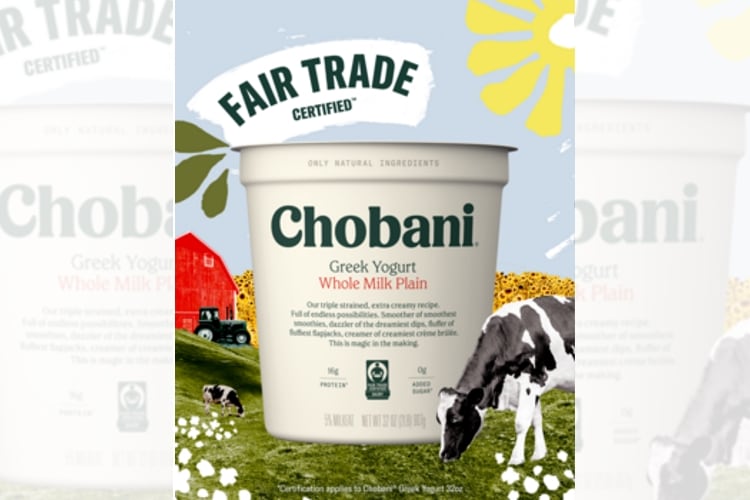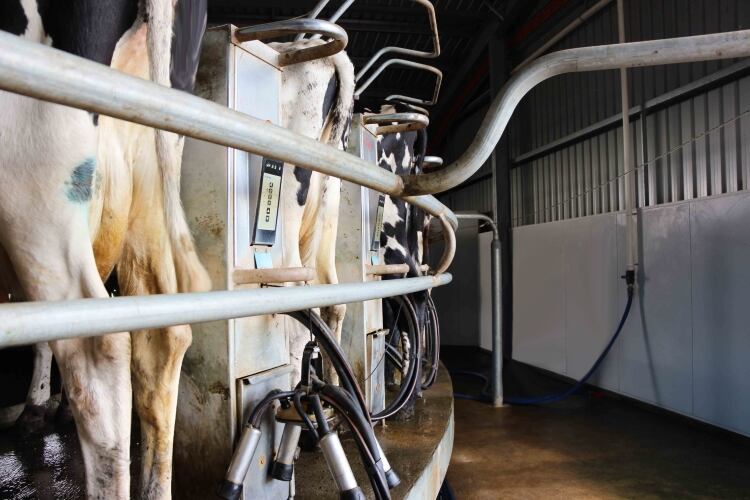We also have our weekly look at the global dairy markets with Liam Fenton at StoneX.
Chr. Hansen launches Vega Culture Kit for fermented plant bases
As dairy-free alternatives to yogurt gain traction worldwide, competition continues to grow among producers striving to offer consumers tasty, healthy and sustainable products.
With the launch of Vega, a culture kit designed for optimal results across the full scope of plant bases, Chr. Hansen aims to enhance its support of plant-based innovation.
Vega is comprised of customizable starter cultures, probiotics and bioprotective strains. Chr Hansen said Vega delivers simplicity with robust performance while offering producers the flexibility to create customized and differentiated features for their products in terms of taste, texture, health and sustainability.
“We are particularly excited about this launch because it gives us the opportunity to apply our 145-year legacy of work within the dairy industry to this highly innovative and rapidly growing segment of the market. We aim to leverage our deep expertise in food fermentation and history of close collaboration with producers to help the industry elevate the art of fermented plant-based craftsmanship,” said Dr Ross Crittenden, Chr. Hansen’s senior director for commercial development.
“Because the composition of plant bases is more varied than traditional dairy products, it is particularly important to utilize cultures specifically curated to meet the performance demands of dairy-free applications. We designed the Vega Culture Kit to be simple to use while still offering the flexibility to create differentiated products that satisfy the primary consumer drivers that power this growing category.”
Chr. Hansen said the Vega Culture Kit offers producers enhanced taste and texture: a choice of starter cultures that can differentially drive flavor and texture in plant-based yogurts. This allows producers to optimize for specific product characteristics by selecting the cultures that yield the results they are after.
It can also provide probiotic support. The Vega nu-trish blends of cultures enable consumers to enjoy the benefits of the world's most-researched probiotics, including Chr. Hansen’s Bifidobacterium, BB-12 and Lactobacillus rhamnosus, LGG. These cultures have been designed specifically for use in plant bases to ensure convenient delivery of the correct serving and stability of probiotics, all while delivering robust performance and clean flavor.
The company said the Vega Culture Kit also boosts sustainability credentials. Vega FreshQ is a culture solution supporting a longer shelf life with superior freshness and fewer quality issues through the action of fermentation.
Vega customers can utilize ongoing, hands-on support from Chr. Hansen’s global team of plant-based fermentation staff and application laboratories, from ideation to post-launch troubleshooting. Chr. Hansen also invests in consumer and market research within the industry to ensure alignment between consumer needs and the features Vega cultures bring to plant-based products.
Vega cultures are produced using ingredients that are dairy-free, contain no GMO ingredients and are free of any animal-derived substances. They are suitable for use in vegetarian, vegan, Kosher and Halal products.
Fair Trade USA launches dairy certification program
Fair Trade USA and Chobani, LLC have launched a certification program for US dairy farms and cooperatives to provide financial premiums to dairy farmers and workers, which aim to protect and empower them while raising sustainability standards.
The announcement is an outgrowth of Fair Trade USA’s partnership with Chobani. The fair-trade certification program is available to milk producers throughout the US.
Fair Trade Certification is intended to provide farm owners and cooperatives with an opportunity to differentiate, increase engagement with consumers, and receive a financial premium for their investments. Certification also provides support for farm workers in an industry that can face challenges in workforce availability, working hours, and farm safety.
An immigrant workforce, which makes up an estimated half of the US dairy workforce and is especially vulnerable to these issues because of limited legal protections, will also benefit from Fair Trade USA’s new dairy program. In collaboration with experts and organizations already working in the space, Fair Trade USA plans to develop an environmental component to this program, which will address the unique challenges of the dairy industry.
“I come from a farming family and I worked at a dairy farm in Upstate New York, so I know first hand the magic of the dairy industry, but it’s hard work and farm families face many challenges in today’s marketplace,” said Hamdi Ulukaya, founder and CEO of Chobani.
“Fair Trade USA’s certification — the first ever in the US dairy industry — will help our dairy farmers build on their hard work to raise farming standards, take care of their workers, many of whom they consider family, ensure the well-being of their animals and their land, while giving consumers greater peace of mind that the dairy they buy demonstrates a commitment to positive economic, environmental, and social pillars.”
“Fair trade is often associated with commodities like coffee, cocoa and textiles produced in the Global South, and not as known within agricultural and farming operations here in America,” said Paul Rice, CEO, Fair Trade USA.
“We believe in bringing the benefits of fair trade to as many in the industry as possible to create impact. Today, that opportunity is in the US dairy sector. The rigorous, time-tested standards, certification systems, and training programs we’ve developed to protect and empower producers, workers, and their communities around the globe will now deliver value to the US dairy producers and workers. We are thrilled to partner with ethically-minded companies like Chobani to bring certified product to the market so consumers have more conscious dairy options.”
Since 1998, Fair Trade producers in more than 45 countries have earned more than $465m in Community Development Funds, which they have used to address their communities’ greatest needs, including enhanced safety, environmental protection, education, health care and clean water. The Fair Trade Certified seal spans more than 30 product categories and can be found in nearly every aisle of the grocery store and beyond.
As part of Chobani’s Milk Matters initiative, Fair Trade USA initiated a pilot program with dairy farms and cooperatives in New York and Idaho to determine how the organization’s Agricultural Production Standard (APS) - used for certification of a wide range of crop and farm settings around the world - could be applied to the dairy industry. The end result - a version of the APS modified for the dairy industry - is now being offered to all dairy farms and cooperatives throughout the US.
Fair Trade USA’s APS incorporates standards and processes developed by the globally-recognized International Labor Organization (ILO). Fair Trade USA is also a member of ISEAL, the international organization driving the advancement of collaborative and transparent sustainability solutions.
The certification process involves a series of modules that incorporate systems, operations, implementation, and auditing of Fair Trade USA’s APS that are designed to ensure product traceability, supply chain transparency and implementation of an internal management system to monitor compliance and progress. The standard also serves as a foundation to ensure safe work conditions, freedom of association, protections against harassment and discrimination, provision of benefits, clear terms of employment and pay slips, reasonable working hours, safe and sanitary housing conditions, and increased access to on-the-job training.
The process typically takes six to nine months to complete, and, when certified, milk buyers are authorized to promote their products using the widely-recognized Fair Trade Certified seal. When Fair Trade Certified milk is purchased, buyers pay an extra amount – the Fair Trade Premium – which is allocated to a community development fund. The funds support democratically-selected projects and on-farm investments to enhance the working environment. A portion of the funds are also available to support investments required to come into compliance with the Fair Trade Standard and projects to deliver on the goals and intentions of the Fair Trade program.
"In an increasingly diverse and competitive market, we are always looking for opportunities to differentiate our product and demonstrate our commitment to continuous improvement,” said Lisa Ford, special projects manager, Cayuga Marketing LLC.
“Fair Trade certification gives us a conduit to demonstrate our ongoing commitment to provide quality milk from members dedicated to furnishing a safe, fair and equitable work environment. The Premium Funds that come with Fair Trade Certified sales will be used to enhance best practices on our certified dairy farms, offer expanded worker training and safety installations, and work to benefit farm worker families and communities."
“Along with care for animals and stewardship of the environment, providing a safe and quality workplace is of critical importance for dairy farmers, their employees and our industry. DFA is proud to work with Fair Trade and Chobani on this innovative pilot. Through this program dairy farmers and dairy farm employees will have access to new resources that can be used to collaborate on impactful initiatives in their businesses and their communities,” said David Darr, senior vice president and chief strategy and sustainability officer, Dairy Farmers of America.
Chobani is releasing Fair Trade Certified Greek yogurt versions for all of its 32oz, multi-serve tubs, including Whole Milk Plain, Low Fat Plain, Non-Fat Plain, Strawberry Blended and Vanilla Blended. Chobani’s Fair Trade Certified yogurt products are sold nationally at all major grocery and retail stores and are produced at Chobani’s Twin Falls, ID, and South Edmeston, NY, production facilities. Chobani plans to expand the certification to other products.
Food and beverage manufacturers urged to make healthier products
Food manufacturers should prepare for increased scrutiny over nutritive claims, according to global food safety certification company, Lloyd’s Register, following growing commitments from retailers to move towards selling healthier products.
It follows a growing trend as major UK retailers making commitments to sell healthier food and drinks and take the lead in supporting the fight to tackle obesity. With retailers looking to seek healthier options, Lloyd’s Register is warning food manufacturers they should prepare for added pressure to rethink how they approach nutritive and functional claims in their products.
According to the World Health Organisation, worldwide obesity has nearly tripled since 1975, with more than 38m children under the age of five overweight or obese in 2019. The commitments from retailers are not exclusive to the UK, either. The promotion of healthy lifestyles is a key health and nutrition policy objective for both the Federal Ministry of Health and the Federal Ministry of Food, Agriculture and Consumer Protection in Germany.
Kimberly Carey Coffin, global technical director at Lloyd’s Register, said, “Governments and consumers are becoming increasingly concerned with health and nutrition, due to rising statistics around obesity and diabetes across the world. We can therefore expect to see more retailers commit to selling healthier foods, and manufacturers must be prepared to adapt.
“As part of this, manufacturers will need to meet the challenge to prioritize nutrients and potential health benefits in future product development. However, they must be alert and ensure that any nutritive or functional claims, such as lowering cholesterol or boosting immunity, can be substantiated. If processes for evidence-based validation of claims are not in place, brand reputation may be at risk.”
Research from Lloyd’s Register highlights how food issues impact brand trust, with one in five UK shoppers having changed brands following reports of a food safety incident or product recall.
Coffin added, “Consumers are becoming increasingly savvy about their dietary decisions, selecting foods that deliver health and wellbeing, and it is reasonable to assume that scrutiny will grow in the area of nutritive and functional claims. Manufacturers must do all they can to ensure that healthy alternatives are authentic and can be substantiated.”




